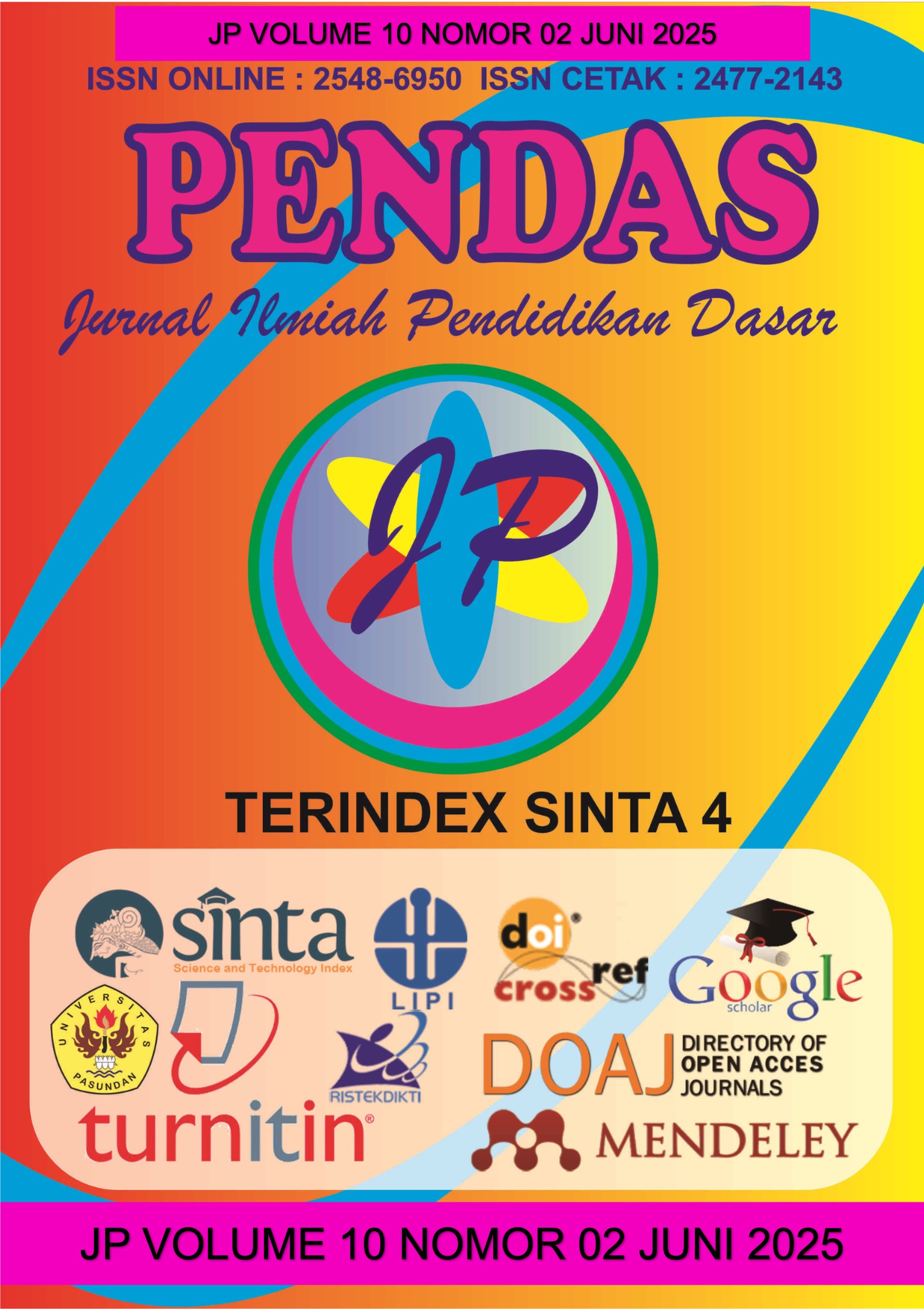OPTIMALISASI BUDAYA LITERASI (CALISTUNG) DALAM MENUMBUHKAN MINAT BACA SISWA KELAS VI SDIT INSAN KAMIL KOTA BIMA
Keywords:
Optimization, Culture, Literacy, Reading, Writing, Reading Interest, StudentsAbstract
The reading interest of the community, especially school children in Indonesia, is still very low. Education in Indonesia is still far behind when compared to developed countries. One indicator of successful education is students who have broad insight and knowledge. Students who have broad insight are students who like to read. The success of education is not measured by the number of students who get the highest score in a particular subject, but the number of students who like to read or commonly known as literacy. The success of education is not measured by the number of students who get the highest score in a particular subject, but the number of students who like to read or commonly known as literacy. This study aims to analyze the optimization of literacy culture of reading, writing, and writing and effective strategies in developing literacy culture in fostering reading interest in class VII students of SDIT Insan Kamil, Bima City. This study uses a qualitative research method with an Exploration Case Study approach. This approach has special attention to the phenomena studied, focuses on the activities of the research subjects, reveals problems, presents data, analyzes data, and obtains data through direct observation. The results of this study indicate that some students in grade VII of SDIT Insan Kamil, Bima City, still have a lack of interest in reading even though a reading literacy program has been held once a week. It can be concluded by researchers that when literacy activities are held in schools there are still students who are less interested in reading, what if literacy activities are not held. It is likely that the school will be far from advanced foreign schools and the generation that is born will be less qualified.
Downloads
References
Chasanah, T. U., Nazidah, M. D. P., & Zahari, Q. F. (2022). Kesiapan Belajar Calistung Siswa SD Kelas Rendah dan Implikasinya Terhadap Penyelenggaraan Layananan Bimbingan Konseling. PAUDIA : Jurnal Penelitian Dalam Bidang Pendidikan Anak Usia Dini, 11(1), 417–428. https://doi.org/10.26877/paudia.v11i1.11232
demmanggsa, sabilaturrizqi, K. (2023). DIGITALISASI PENDIDIKAN : AKSELERASI LITERASI DIGITAL. 4(5), 11158–11167.
Devi, N. U. K. (2020). Adaptasi Pranata Keluarga Pada Proses Pembelajaran E-Learning Dalam Menghadapi Dampak Pandemi Covid-19. Publicio: Jurnal Ilmiah Politik, Kebijakan Dan Sosial, 2(2), 1–6. https://doi.org/10.51747/publicio.v2i2.599
Fadilla, A. R., Wulandari, P. A., Bahasa, F., & Yogyakarta, U. N. (2023). JURNAL PENELITIAN Volume 1 No 3 II Agustus 2023 E-ISSN : 2986-5573 ( Online ) Volume 1 No 3 II Agustus 2023 E-ISSN : 2986-5573 ( Online ) Page 34-46. 1(3), 34–46.
Fauzia, R., & Hadikusuma Ramadan, Z. (2023). Implementasi Pembelajaran Berdiferensiasi Dalam Kurikulum Merdeka. Jurnal Educatio FKIP UNMA, 9(3), 1608–1617. https://doi.org/10.31949/educatio.v9i3.5323
Handayani, T. U. (2020). Penguatan Budaya Literasi Sebagai Upaya Pembentukan Karakter. Jurnal Literasi, 4(1), 67–69.
Kelian, Y. S., & Pattimura, U. (2023). BELAJAR BACA TULIS ( CALISTUNG ) UNTUK PESERTA DIDIK. 1, 65–68.
Madu, J. (2022). membentuk literasi membaca pada peserta didik di sekolah dasar. 8(3).
Nurcholis, R. A., & Istiningsih, G. (2021). PROBLEMATIKA DAN SOLUSI PROGRAM LITERASI BACA-TULIS.
Nurul Fadhilah, & Mukhlis, A. M. A. (2021). Hubungan Lingkungan Keluarga, Interaksi Teman Sebaya Dan Kecerdasan Emosional Dengan Hasil Belajar Siswa. Jurnal Pendidikan, 22(1), 16–34. https://doi.org/10.33830/jp.v22i1.940.2021
Permai, C., Taman, O. F., & Permai, C. (2020). THE CULTIVATION OF CHARACTER DELIGHT IN READING BY. 6, 147–162.
Priasti, S. (2021). Jurnal Kependidikan: 7(2), 395–407.
Raya, I. P., & Raya, I. P. (2021). Memahami Teknik Pengolahan dan Analisis Data Kualitatif. 1, 173–186.
Rohim, C. D., & Rahmawati, S. (2020). Di Sekolah Dasar Negeri. Kajian Pendidikan Dan Hasil Penelitian, 6(3), 2.
Rohmah, M., Rahandi, V. Z., Salamah, U., Shabrina, F. A., Wijaya, A., Fisika, P. P., Surabaya, U. N., Matematika, P. P., Surabaya, U. N., Surabaya, U. N., Jasmani, P. P., Surabaya, U. N., & Privat, P. (2024). Metode Private Learning dalam Pembelajaran Calistung Sebagai Upaya Pemberantasan Buta Aksara dan Meningkatkan Literasi dan Numerasi Untuk Anak Sekolah Dasar. 02(01), 7–15.
Rohman, N. (2022). Al-Adzka : Jurnal Ilmiah Pendidikan Guru MI Literation Culture Living at MI Qurrota A ’ yun. 12(2), 109–120. https://doi.org/10.18952/aladzkapgmi.v12i2.7586
SHELA. (2020). PELAKSANAAN PROGRAM LITERASI DI SEKOLAH DASAR NEGERI 192 PEKANBARU.
silalahi, galingngging, H. (2023). BIMBINGAN BELAJAR CALISTUNG ( MEMBACA , SEKOLAH DASAR. 7(2), 804–812.
Sintia, T., Wati, M., Sarah, D., Putri, N., Pendidikan, S., Sekolah, G., Bangsa, P., & Keluarga, L. (2024). Pengenalan Pengaruh Lingkungan Keluarga Terhadap Literasi Anak Sekolah Dasar. 4(4), 565–568.
Siswoyo, A. A., & Hotimah, K. (2021). Pengembangan Budaya Literasi Menulis bagi Guru Sekolah Dasar Melalui Pelatihan Pembuatan PTK dan Artikel Ilmiah. Abdimas Pedagogi: Jurnal Ilmiah Pengabdian Kepada Masyarakat, 4(1), 51. https://doi.org/10.17977/um050v4i1p51-56
Umar, M. (2020). Peranan Orang Tua Dalam Meningkatkan Prestasi Belajar Anak. Jurnal Ilmiah Edukasi, 12(1), 108–139. https://doi.org/10.24239/msw.v12i1.591
Utami, N. P., Yanti, P. G., Guru, P., Dasar, S., Muhammadiyah, U., & Hamka, P. (2022). Pengaruh Program Literasi terhadap Hasil Belajar Bahasa Indonesia Siswa Sekolah Dasar. 6(5), 8388–8394.
Downloads
Published
Issue
Section
License
Copyright (c) 2025 Pendas : Jurnal Ilmiah Pendidikan Dasar

This work is licensed under a Creative Commons Attribution 4.0 International License.














































